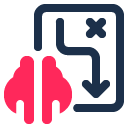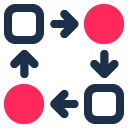Coderio Powered by AI.
How we are leveraging AI throughout the Software Development Life Cycle.
AI-Powered Software Development.
At Coderio, we’re reimagining the Software Development Life Cycle by seamlessly integrating cutting-edge AI technologies into every stage of the process. This isn’t just innovation for the sake of innovation—it’s a game-changer for our clients. By embedding AI into planning, design, coding, testing, deployment, and maintenance, we’re delivering smarter, faster, and more scalable solutions that drive real business results.
The result? Future-proof solutions built with intelligence from the ground up. Our AI-enhanced approach not only reduces time-to-market and boosts quality, but it gives our clients a powerful competitive edge.
AI Assisted Software Development Life Cycle.
SDLC Reimagined
In the early stages, we use AI-powered analytics and predictive modeling to uncover valuable insights, identify potential risks, and shape strategies that are laser-focused on our clients’ goals. Our intelligent planning tools ensure projects get off to the right start, with clear priorities and optimized resource allocation. Design becomes more precise, more user-focused, and better aligned with the outcomes our clients want to achieve.
As development gets underway, AI steps in to accelerate coding, automate repetitive tasks, and continuously optimize performance. Our developers are supported by smart tools that enhance code quality and speed, while AI-driven testing ensures issues are caught early, before they become costly problems. It’s a streamlined, high-efficiency process that gets your product to market faster and with greater confidence.
Software Development Life Cycle Reimagined.
Define
Use Case and Requirements Generation: AI can analyze historical project data, user behavior patterns, and documentation to suggest use cases, refine requirements, and even identify potential conflicts or inconsistencies early on.
Effort Estimation and Scheduling: AI models trained on past project data can provide more accurate estimates of time and resource requirements, helping teams plan more efficiently.
Architecture Design: AI tools can analyze different software architectures based on project requirements, suggesting the most optimal ones in terms of scalability, performance, and cost.
Design
Intelligent UI/UX Design: AI can analyze user behavior patterns and industry benchmarks to suggest interface layouts, navigation flows, and design elements that improve usability and engagement. It can even generate wireframes or mockups tailored to target user personas.
Architecture Recommendation Engines: AI tools can evaluate project requirements—such as scalability, performance, and security needs—and recommend optimal software architectures (e.g., microservices, event-driven, serverless). These suggestions are based on historical project data, domain knowledge, and infrastructure constraints.
AI-Assisted Design Validation: AI can simulate user interactions with proposed designs to identify usability issues, accessibility gaps, or workflow inefficiencies before development begins. This helps refine concepts early, reducing rework and ensuring the solution aligns with business goals and user needs.
Develop
Code Generation and Suggestions: Tools like GitHub Copilot use AI to suggest full lines or blocks of code based on context, speeding up development and reducing common errors.
Early Error and Vulnerability Detection: AI-powered static code analysis can identify potential bugs, security vulnerabilities, and style issues before the testing phase begins.
Intelligent Refactoring: AI can recommend refactoring strategies to improve code readability, performance, and maintainability more efficiently than manual methods.
Unit Test Generation: Some AI tools can automatically generate unit test cases based on the code, increasing test coverage and saving time otherwise spent writing tests manually.
Test
Automated Test Case Generation: AI can analyze requirements and code to automatically generate a wide range of test cases, including edge cases and unexpected scenarios, increasing test coverage and thoroughness.
Intelligent Testing: AI can prioritize test cases that are most likely to fail, optimizing test execution time. It can also identify failure patterns to help developers diagnose issues more quickly.
Test Data Generation: AI can generate realistic and varied test data, making it easier to test different scenarios and reducing the need for manual data creation.
Deploy
Deployment Automation: AI tools can optimize Continuous Integration/Continuous Deployment (CI/CD) processes by identifying potential issues before deployment and automating rollbacks in case of failures.
Predictive Deployment Planning: AI can analyze historical deployment data and system usage patterns to recommend the best time windows for releases, minimizing downtime and user impact. It can also forecast potential risks based on code changes or infrastructure constraints before they reach production.
Anomaly Detection During Deployment: AI can analyze real-time telemetry, logs, and performance metrics during deployment to detect anomalies such as service degradation, failed integrations, or unusual latency patterns. This allows teams to catch issues as they happen and take corrective action before they impact end users.
Smart Rollbacks and Auto-Remediation: If a deployment introduces critical errors, AI systems can trigger automated rollbacks based on predefined thresholds or learned patterns. They can also suggest or apply targeted fixes by comparing the faulty release to stable baselines—minimizing disruption and accelerating recovery.
Deployment Risk Scoring: Before code is deployed, AI can assess risk levels by analyzing change history, test coverage, code complexity, and past incident patterns. This enables more informed go/no-go decisions and prioritizes extra validation where it’s needed most.
Maintain
Intelligent Monitoring: AI can analyze performance metrics and logs in real time to detect anomalies, predict potential issues, and alert teams before they impact end users.
Infrastructure Optimization: AI can assess resource usage and recommend optimizations to reduce infrastructure costs—whether in the cloud or on-premise—while maintaining performance and scalability.
Self-Monitoring and Adaptive Scaling: Post-deployment, AI systems can continuously monitor application performance and user behavior to automatically trigger scaling actions or configuration adjustments, ensuring optimal performance and resource efficiency in real time.
Competitive Advantage & Client Value.
Our AI-driven approach yields tangible business benefits for our clients.
We integrate AI into every stage of the software development life cycle. This enhances our engineering capabilities and allows us to deliver high-quality products at speed.
By turning these AI-driven efficiencies into real-world value, we help our clients maximize their ROI, accelerate innovation, and gain a competitive edge in the market.
- Faster Time to Market: With AI accelerating design, development, and testing, we shorten delivery cycles significantly.
- Reduced Development Costs: Automating repetitive or low-value tasks means fewer billable hours required for high-quality results.
- Higher Software Quality: Early bug detection, smarter testing, and enforced coding standards lead to fewer post-deployment issues.
- Increased Innovation Bandwidth: Developers have more time to focus on core business features and value creation.
Enhancing Software Development with AI.
AI-Powered Requirement Analysis
AI helps us bridge the gap between business goals and technical execution by parsing unstructured requirements—like documents, emails, and meeting transcripts—to identify ambiguities, contradictions, or gaps. It then generates clear user stories and technical tasks aligned with industry best practices, while mapping requirements to system components to estimate impact or promote reuse. This dramatically shortens the discovery phase, enhances accuracy, and ensures alignment from day one.

Reverse Engineering Legacy Code with AI
Sometimes, your in-house development team may face technical issues they can’t manage alone. Whether you need help on a project or need to scale your team, IT staff augmentation is the answer.
This engagement model allows you to quickly bring in external talent with specialized skills to accelerate development, fill gaps, and achieve your business goals. Here’s why IT staff augmentation is crucial in today’s business landscape and why it’s a solution worth considering for your organization.

Code Generation & Refactoring
AI-powered coding assistants enhance our development process by autocompleting functions, suggesting optimized implementations, refactoring legacy code for better performance and maintainability, and generating boilerplate code—allowing our developers to focus on building smarter, more complex solutions.

AI-Assisted Testing
Our QA teams leverage AI to automatically generate unit, integration, and end-to-end test cases based on code behavior, predict high-risk areas that need extra attention, and detect flakiness or redundancy in test suites—ensuring smarter, faster, and more reliable quality assurance.

Natural Language to Code Translation
We deploy models that interpret user stories and requirement documents written in plain language, and translate them into pseudo-code, test cases, or even ready-to-validate implementations—significantly reducing requirements translation errors.

Smart Debugging & Code Reviews
AI-driven linters and analyzers proactively flag potential security vulnerabilities, logical inconsistencies, and performance issues—boosting code quality while enabling human reviewers to focus on higher-level architectural and functional insights.

Intelligent Project Management
Our delivery managers rely on AI copilots to forecast delivery timelines using historical velocity, identify potential delays or resource constraints, and dynamically reassign tasks based on real-time priorities—ensuring smoother execution and on-time delivery.

Looking Ahead
We see AI as a catalyst for a new era of development—enabling self-healing systems, real-time personalized interfaces, and privacy-first federated learning. We’re committed to pushing boundaries while staying rooted in quality, ethics, and client success.

Our AI & GenAI Services.
Our AI-driven development services bring speed, intelligence, and innovation to every stage of the Software Development process, delivering higher-quality software with less risk and more business value.

Strategic AI and GenAI Consulting
Helping companies identify opportunities and define adoption strategies.

Generative AI Application Development
Creating customized solutions for content, image, code generation, and more.

AI and GenAI Model Integration
Embedding pre-trained or custom models into existing systems.

Process Optimization with AI
Intelligent automation and efficiency improvements.

Intelligent Chatbots & Virtual Agents
Development of chatbots and Virtual Agents powered by AI and Generative AI.
Security by Design in AI Development.
Secure AI by Design
Integrate security from the earliest stages of AI development by embedding best practices into system architecture, data handling, and model deployment. This proactive approach reduces risks before they arise.
Developer Training
Ensure development teams are well-versed in AI-specific security challenges, such as model poisoning, adversarial attacks, and data privacy concerns. Ongoing training helps teams build and maintain safer AI systems.
Model Validation & Monitoring
Establish rigorous validation procedures and continuous monitoring to detect model drift, bias, or vulnerabilities. This ensures AI systems remain reliable, secure, and aligned with business objectives over time.
Protect Sensitive Data
Handle training data responsibly by anonymizing or securing sensitive information. Compliance with privacy regulations like GDPR and CCPA must be a priority throughout the AI lifecycle.
Prevent Data Leakage
Minimize the risk of models unintentionally exposing sensitive training data by applying techniques such as federated learning, differential privacy, or secure multi-party computation.
Stay Updated
AI security is rapidly evolving. Stay informed on the latest research, frameworks, and best practices to proactively strengthen defenses and respond to emerging threats.
Custom-Built AI Agents.
Beyond generic AI tools.
Beyond adopting generic AI tools, we invest in custom-built AI agents tailored to our workflows and client needs. These custom agents enhance our team’s productivity and serve as a key differentiator in our delivery model. They allow us to work at scale without compromising quality or velocity.
These agents are fine-tuned on our internal data and development conventions to act as:
- Code review bots trained on our best practices and coding standards.
- Documentation agents that generate and maintain internal documentation by parsing codebases and Git histories.
- DevOps assistants that monitor CI/CD pipelines and recommend build or deployment optimizations.
- Support agents that triage bug reports or user feedback and automatically classify and route them.
Book a Discovery Call.
Accelerate your software development with our AI-assisted nearshore engineering teams.
